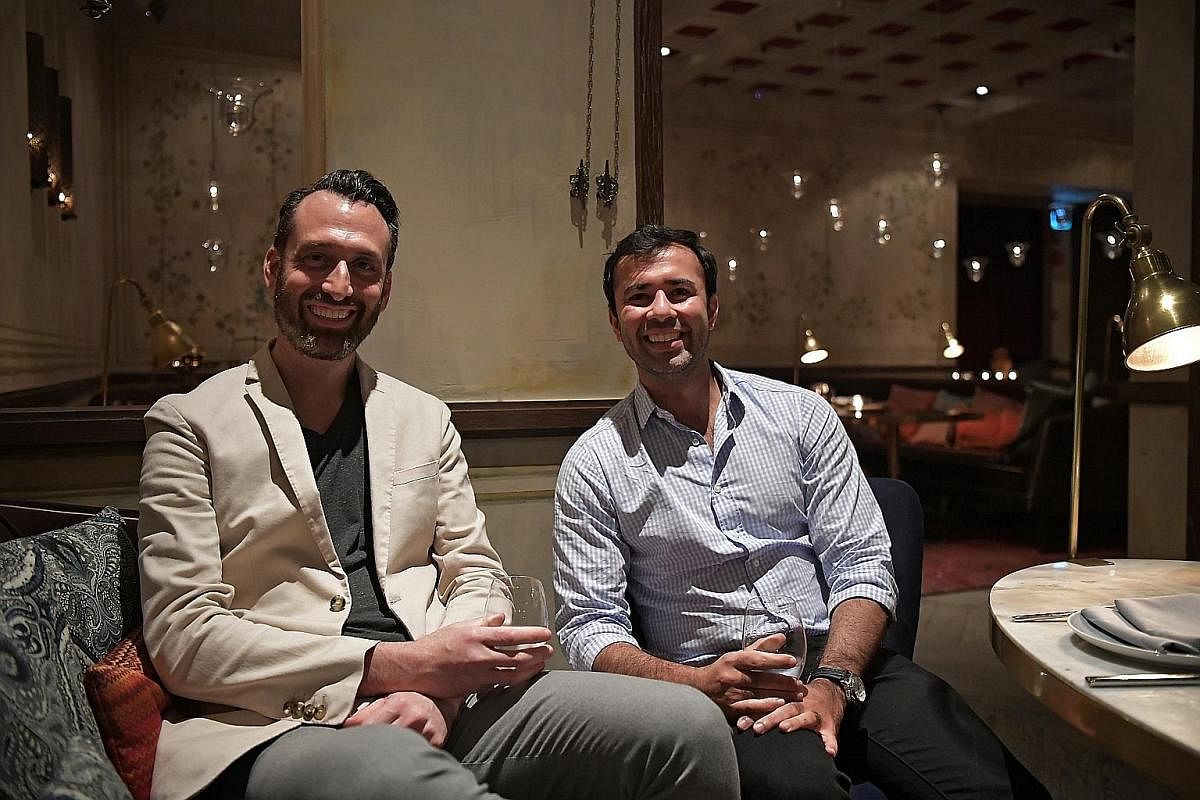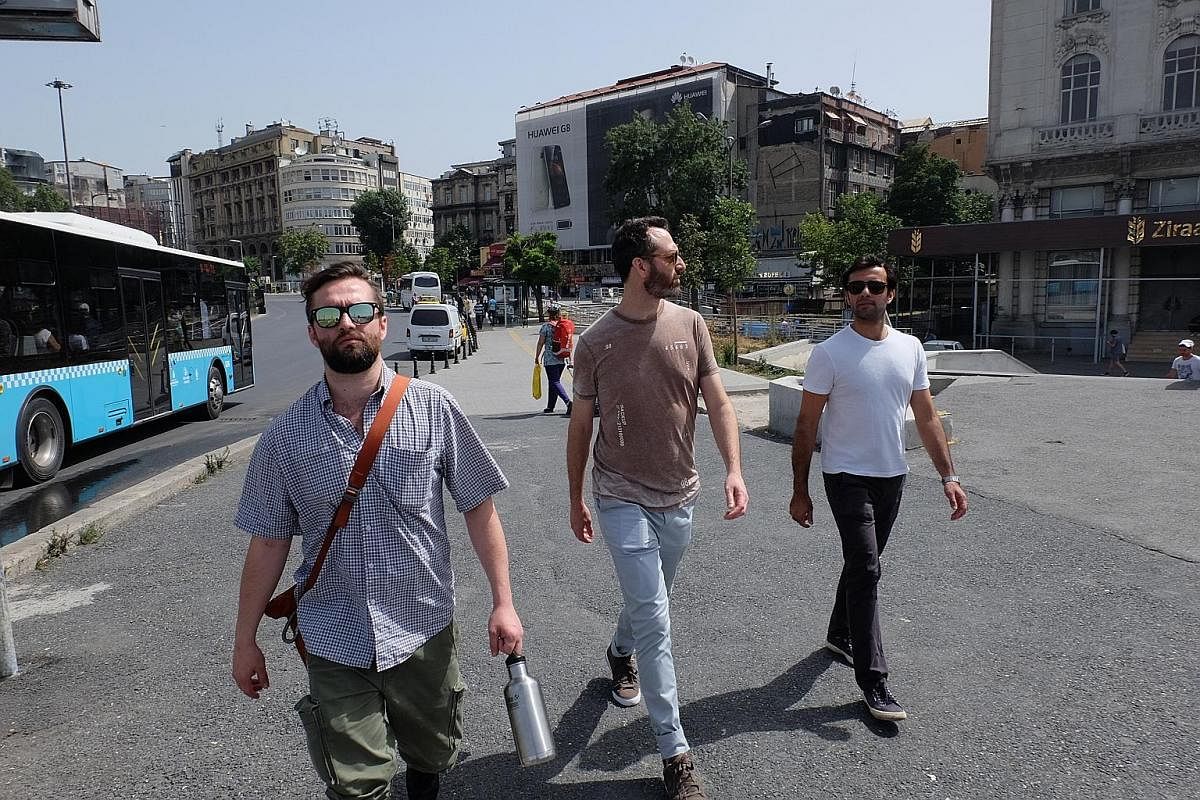Two's Company With The Dandy Partnership
Dandy Partnership's owners open restaurants that create emotion
Restaurant entrepreneurs Rohit Roopchand and Michael Goodman chase emotion in their eateries


After a chat with Rohit Roopchand and Michael Goodman, the adage that it takes complementary types to make a strong team seems truer than ever.
Both are partners in The Dandy Partnership, which runs restaurants that take familiar concepts in new directions.
Mr Roopchand, head of operations, has a dry, careful way of speaking and is wary of slogans - he jokes about the abuse of the phrase "modern urban" in marketing-speak.
Mr Goodman, in charge of food and design, can carry on with enthusiasm about murals, the joy of a good taco and the emotional, fuzzier aspects of the food and beverage trade.
Together with Mr Michael Macnab, who focused on marketing, they founded the company that runs the award-winning establishments Neon Pigeon, Fat Prince, Summerlong and The Ottomani.
Their first venture, the izakaya-inspired Neon Pigeon, opened in 2015.
Mr Macnab is still a partner, but now lives in Seattle and works at Amazon.
The 37-year-old Roopchand says: "We wanted to do something cool, to have a place similar to the bars and restaurants we were going to in New York."
These are mid-budget bistros and bars that have a certain something - "cool", "vibe" and "attitude" are words the pair use a lot when asked to pin down what it is.
Mr Goodman, 46, says they are catering to customers seeking a place that is mid-priced and unfussy, but who know exactly what it is and what it is not.
"The biggest thing about restaurants - and a lot of people don't understand this, which is crazy to me - is that it's not about the food, service or design.
"It's about the experience and how all these things come together to create the emotion," says Mr Goodman, a chef-turned-designer.
"And when you have that emotion, you have a successful restaurant," adds the American, who also runs the Asia arm of restaurant and hospitality design firm EDG, headquartered in San Francisco.
In 2013, Mr Roopchand, with his brother Harsh, opened the Asian-inspired Fatty Crab restaurant in Hong Kong. Mr Macnab, a friend, was an investor.
Mr Roopchand had been a controller in a New York hedge fund and was looking for change after the 2008 financial crisis.
Getting into the hospitality business with his Hong Kong-based brother was one attractive option.
Mr Macnab had a hunch that Singapore was ripe for an opening and wanted Mr Roopchand's buy-in.
Mr Goodman, who met Mr Roopchand in Hong Kong and offered informal advice on the Fatty Crab project, was invited to join the Singapore venture and the partnership was born.
Among the locations they checked out was the gutted former AIA Building in Keong Saik Road.
Mr Roopchand and Mr Macnab were sceptical - the building was on the wrong end of Keong Saik, away from the side thronged nightly by thirsty, hungry young professionals.
"It was all exposed beams and a hacked-up floor," says Mr Roopchand, an Indian national with a British accent picked up from boarding schools in India and the United Kingdom.
But Mr Goodman saw potential. Chasing that "emotion", as he calls it, started with a raw, scuffed-up look for the interiors.
He told contractors to make the floors "not so nice", an instruction that sailed over their heads.
"They were like, 'What?'," he says. So he went the do-it-yourself route.
Mr Roopchand adds: "The staff were in training and they said, "Wait, you want us to dirty this amazing smooth floor?'"
After contractors had laid down a pristine layer of wet cement, Goodman asked staff members to dig up earth outdoors and spread it inside, pockmarking the surface.
Urban grit, in one sense, was achieved.
Mr Goodman found inspiration in the izakaya eateries of Tokyo's Shinjuku district, but added new-age cocktails and out-there decor.
For wall art, he worked with Zul Othman, an artist who goes by the name Zero.
"As soon as you walk in, you see this massive mural of a pigeon with headphones on," he says.
The staff are trained to put customer happiness first and ignore the traditional servant-master relationship, and if that means giving away sake in drinking games orchestrated by the wait staff, that is not only fine, but also encouraged.
The menu, consisting of large and small plates, puts a twist on traditional Japanese fare.
A favourite is a plate of chilled cucumbers dressed with a sesame sauce (goma), chilli peanuts and nori seaweed.
Mr Goodman says: "It's not Japanese, but it honours Japanese food."
New directions
Visitors to Neon Pigeon remark on a factor diners rarely comment on: the music, turned up louder than usual, with a playlist reflecting the spot's indie feel.
Mr Goodman curated a Spotify list for the opening, which was updated regularly, but now works with an audio programming company to create custom playlists for each outlet.
Neon Pigeon provokes strong reactions. Its brashness and music, among other things, are too much for some, but it still draws nightly crowds.
That first success told the partners they were onto something.
Last year, those insights evolved and became Fat Prince in Peck Seah Street.
Mr Goodman and Mr Roopchand had fallen for Istanbul's architecture and its way with mezze, kebabs and creative takes on Asian and Middle Eastern classics.
Again applying the rule of never doing a me-too project, they saw that while there were many restaurants serving that style of cuisine, they could find none that served alcohol or offered the highly curated look they could achieve.
In May this year, Summerlong, specialising in Mediterranean cuisine with a beach-club feel, opened at Robertson Quay.
This was followed by The Ottomani, offering a more premium Middle Eastern supper club experience in a room adjoining Fat Prince.
There is a rough 50-50 expatriate-local split at their outlets, but they are confident that, in time, the local component will grow.
The pair remember how, while checking out concepts for Neon Pigeon, they trawled Tokyo's izakaya joints and stumbled on a cramped little shop unlike others they had visited.
It was warm, welcoming and vibrant. They are still guided by that memory.
Says Mr Goodman: "It was really fun, super fun. I remember looking at Ro and telling him I've never seen this energy in Singapore.
"How are we going to bring this here? We have to figure it out."
Rohit Roopchand on Michael Goodman
Developing trust in his partner
"Three partners with three very strong opinions" is how Rohit Roopchand describes The Dandy Partnership.
"Mikey", their nickname for Mr Michael Macnab, has experience in start-ups and marketing; Mr Michael Goodman takes care of design and creative aspects; and Mr Roopchand covers financials and operations.
The 2008 financial crisis left Mr Roopchand, then working in a hedge fund, disillusioned. He left New York and the hedge fund industry behind and travelled the world.
His travels took him to Mumbai, where his parents live, and he thought he might want to be in this region to be closer to family.
With his brother Harsh, he brought Asian-themed restaurant Fatty Crab from New York to Hong Kong. It was to be the start of his new career in food and beverage.
"When I was still in finance, someone asked me what I would do if I were not doing this. Immediately, my answer was: hospitality," says Mr Roopchand of his career change.
Through friends, he met Mr Goodman, who, as head of Asia for design firm EDG, travelled through Hong Kong frequently.
For the two men, food was both a career and passion and they hit it off.
In their business, Mr Roopchand takes care of daily operations while Mr Goodman covers creative tasks, such as menu supervision, interior design and brand positioning.
In 2014, in the early phases of the project that would become Neon Pigeon, Mr Roopchand left his base in Hong Kong to visit the space in the former AIA Building that Mr Goodman had fallen in love with.
"I liked it for the most part. My only concern was that the ceilings were really low. I could reach up and touch them," says Mr Roopchand, who is single.
But Mr Goodman seemed unfazed by what seemed to Mr Roopchand to be a huge problem.
But after he explained his ideas in detail, Mr Roopchand felt better about the site's odd dimensions. "I was like, 'All right, I trust you', and that is how it has been since," he says.
Michael Goodman on Rohit Roopchand
Enjoying a strong bond of friendship
For Michael Goodman, The Dandy Partnership is a side gig, but a very important one. The American heads the Asia arm of EDG, a design firm that helps create restaurants and other businesses.
After working as a chef on both coasts in the United States and in between, with overseas experience that included a stint at the Amandari resort in Bali, he realised that his heart lay in launching restaurants, rather than in running them.
While there is a general agreement that Mr Goodman is the ideas guy while Mr Roopchand runs the show and balances the books, there is nothing that says that lines cannot be crossed. "Rohit throws ideas at me and I don't love every one, but that's cool," says Mr Goodman, who is engaged to Ms Jessica Sun, a Taiwanese optometrist based in Singapore. "It makes me think of something else and gets me out of my comfort zone."
Mr Roopchand has as much passion for food as Mr Goodman and his views matter, he says. All ideas need "stress-testing", as they call it, no matter whose it is.
Each partner quizzes the other to see if he has considered all the implications of a decision.
Mr Roopchand, in particular, digs into the details of the business plan, checking to see if factors such as seasonal traffic and human resource needs have been over-or under-estimated. It helps that both men share certain values.
Both describe themselves as being averse to risk and believe that once a plan of action is agreed on, even those who are passionately in favour of another option must throw himself behind it wholeheartedly.
Their working relationship is based on a strong bond of friendship.
As Mr Goodman recalls - to Mr Roopchand's and his laughter - it is a friendship that has passed the torture test of any relationship: sharing a hotel room, which happened when they toured Tokyo getting ideas for Neon Pigeon. "My bed was next to his. It was so close. It was awkward.
Join ST's Telegram channel and get the latest breaking news delivered to you.
A version of this article appeared in the print edition of The Straits Times on November 27, 2017, with the headline Dandy Partnership's owners open restaurants that create emotion. Subscribe

